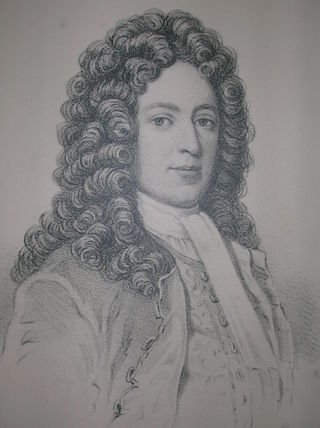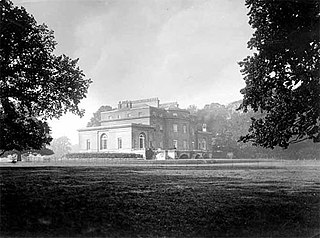
Earl of Galloway is a title in the Peerage of Scotland. It was created in 1623 for Alexander Stewart, 1st Lord Garlies, with remainder to his heirs male bearing the name and arms of Stewart. He had already been created Lord Garlies in the Peerage of Scotland in 1607, with remainder to the heirs male of his body succeeding to the estates of Garlies. This branch of the Stewart family were distant relatives of the Stewart Kings of Scotland.

Sir John Clerk, 2nd Baronet was a Scottish politician, lawyer, judge and composer. He was Vice-President of the Philosophical Society of Edinburgh, the pre-eminent learned society of the Scottish Enlightenment. Clerk was also the father of George Clerk-Maxwell and John Clerk of Eldin, and the great-great-grandfather of the famous physicist James Clerk Maxwell.

Alexander Seton Montgomerie, 9th Earl of Eglinton was a Scottish peer, lord of the Eglinton Estate.
Alexander Stewart, 6th Earl of Galloway was a Scottish aristocrat.
Sir Patrick Vans was a Scottish army officer and politician who sat in the British House of Commons between 1710 and 1722.
Sir Henry Watkin Dashwood, 3rd Baronet was an English landowner and politician who sat in the House of Commons between 1775 and 1795.
Sir David Dalrymple, 1st Baronet, of Hailes was a Scottish advocate and politician who sat in the Parliament of Scotland from 1698 to 1707 and in the British House of Commons from 1707 to 1721. He served as Lord Advocate, and eventually Auditor of the Exchequer in Scotland in 1720.

Sir Herbert Eustace Maxwell, 7th Baronet, was a Scottish novelist, essayist, artist, antiquarian, horticulturalist, prominent salmon angler and author of books on angling and Conservative politician who sat in the House of Commons from 1880 to 1906.
Sir Alexander Penrose Cumming-Gordon, 1st Baronet was a Scottish politician.
Sir Charles Wolseley, 2nd Baronet, of Wolseley in Staffordshire, was an English politician who sat in the House of Commons at various times between 1653 and 1660. He held high office during the Commonwealth.
Sir Andrew Agnew, 2nd Baronet was a Scottish parliamentary shire commissioner for Wigtownshire and Sheriff of Kirkcudbright.
Sir James Dalrymple, 2nd Baronet was Member of Parliament for Haddington Burghs and the Principal Auditor of the Exchequer in Scotland.

Monreith House is a category A listed Georgian mansion located 1.5 kilometres (0.93 mi) east of the village of Port William in Mochrum parish in the historical county of Wigtownshire in Dumfries and Galloway, Scotland. The classical-style house was designed by Alexander Stevens in 1791, for Sir William Maxwell, 4th Baronet. The new house replaced the now-ruined Myrton Castle on the estate which was partially dismantled to provide stone for the house. The grounds of the house are included in the Inventory of Gardens and Designed Landscapes in Scotland, the national listing of significant gardens, and are classed as "outstanding" in five out of six categories.

James Du Pré (1778–1870), of Wilton Park, Beaconsfield, Buckinghamshire, was an English politician.
Sir Robert Gordon, 4th Baronet (1696–1772) was a Scottish landowner and politician who sat in the House of Commons from 1715 to 1722.

Sir William Gordon, 1st Baronet was a Scottish politician who sat in the House of Commons between 1708 and 1742.
Sir Robert Pollock, 1st Baronet, of Pollok, was a British Army officer and Scottish politician who sat in the Parliament of Scotland from 1700 to 1707 and in the British House of Commons from 1707 to 1722.
Sir Joseph Pennington, 2nd Baronet, of Muncaster, Cumberland, was a British landowner and Whig politician who sat in the House of Commons from 1734 to 1744.
Sir Cleave More, 2nd Baronet, of Bank Hall, Walton, Lancashire, was a Whig politician who sat in the House of Commons from 1709 to 1710.
The Maxwell baronetcy of Monreith was created in the Baronetage of Nova Scotia on 8 January 1681 for William Maxwell of Monreith House in Mochrum, Wigtownshire.







